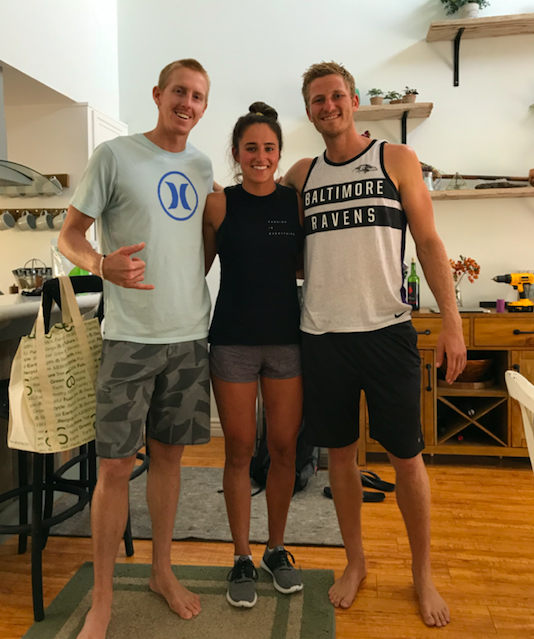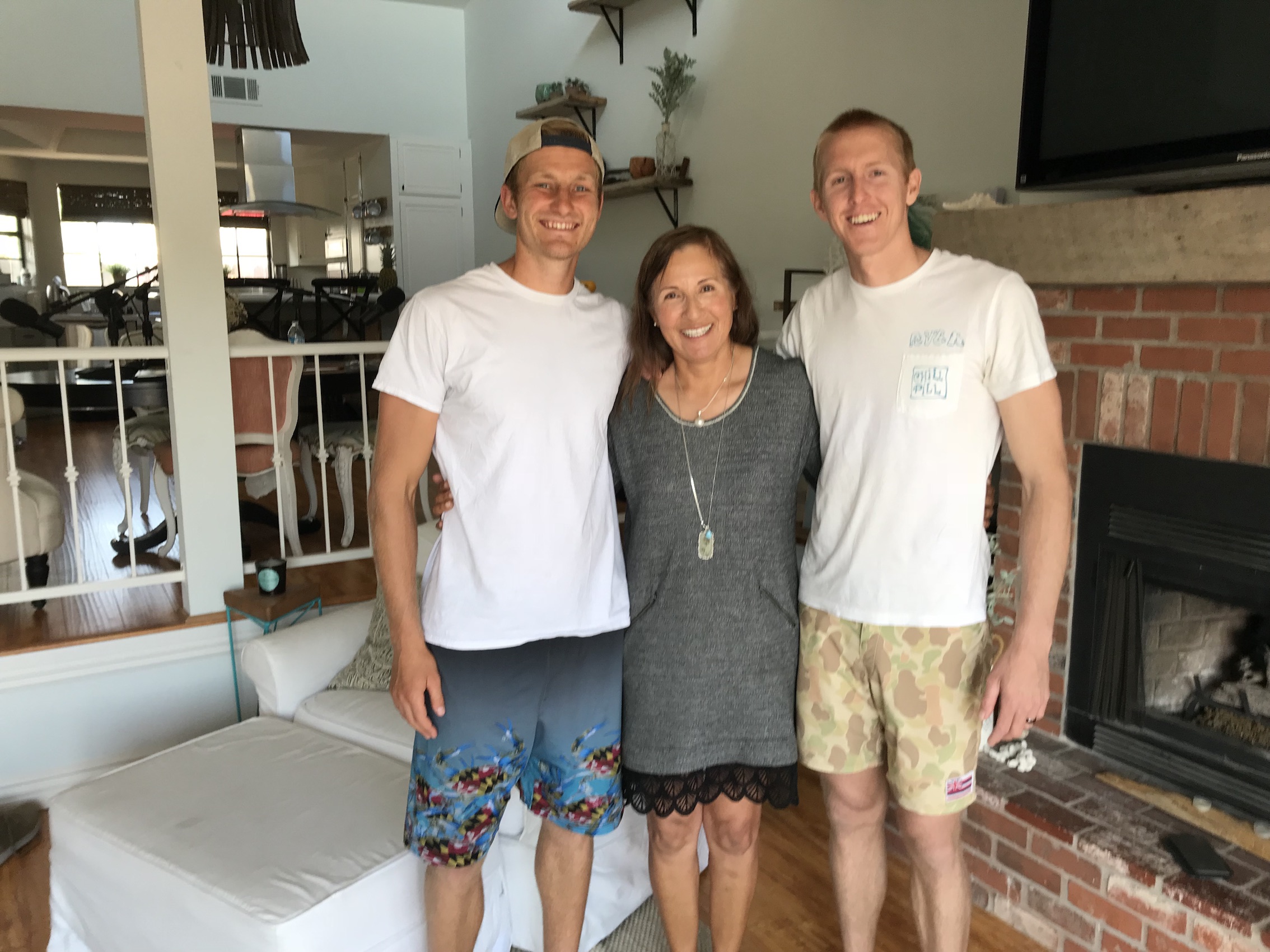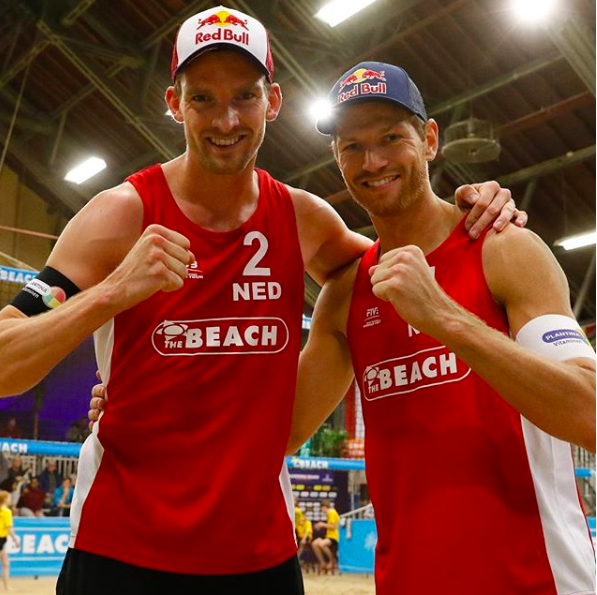

1.1M
Downloads
469
Episodes
SANDCAST is the first and leading beach volleyball podcast in the world. Hosts Tri Bourne and Travis Mewhirter take listeners into the world of the AVP, Volleyball World Beach Pro Tour and any other professional beach volleyball outlets, digging deep into the lives of the players both on and off the court as well as all of the top influencers in the game.
Episodes

Wednesday Jun 13, 2018
Sarah Sponcil, Pac-12 Champ, National Champ, AVP finalist
Wednesday Jun 13, 2018
Wednesday Jun 13, 2018
It may seem difficult to imagine at first, what with a Pac-12 title, an NCAA Championship and an AVP final under her belt in the span of just a few weeks, but yes, Sarah Sponcil does struggle from time to time.
Take Spanish, for example.
“I have not taken it since I was in fifth grade,” she said on SANDCAST: Beach volleyball with Tri Bourne and Travis Mewhirter. “A lot of people take Spanish in high school, so it was elementary Spanish and I was like ‘Ok, we’re chillin’ with the colors and the weather and all that stuff and the lady is like ‘Ok so the next class we’re going to be speaking in full Spanish. And I was like ‘Wait, what? What did I sign up for? Is there a level below this?’ So that’s been kind of a struggle.”
But on the court? It may take some digging to find a soft spot in Sponcil’s game. Partnered with Lauren Fendrick for Austin, Sponcil won her first four career AVP main draw matches in straight sets, setting up a final against April Ross and Alix Klineman.
“I think I just had that mentality – people are going to be stronger, faster,” Sponcil said. “I think I just tried to put the pressure on, trying to stay aggressive. I think a lot of people go to shots if they get blocked, they kind of just do that. I felt like I was full force. I just want to swing, if I get blocked, I’ll just work around.”
She worked around Angela Bensend and Olaya Pazo, Caitlin Ledoux and Kendra VanZwieten, Janelle Allen and Kerri Schuh, Karissa Cook and Katie Spieler.
It was one thing to play alongside an Olympian and Stanford’s assistant coach. It was an entirely different feeling to play against Ross, the player Sponcil has looked up to since she began playing volleyball.
“I mean, you’re playing against April Ross,” Sponcil said. “I literally had pictures of her when I was like, 14 and 17. Just to be playing against her and seeing me stack up against her was really cool. It was a really great experience.”
She watched the film a few times, enough to know that she stacked up just fine. Ross and Klineman had only dropped a single set prior to the finals, yet there was Sponcil, pushing the two-time Olympic medalist to a 24-22 first set, and again to a 25-23 second set.
“We basically played a third game,” Sponcil said, laughing. “I felt like I was taking it point by point. I don’t know. I thought it was an amazing challenge. You look up to someone for so long and you don’t want to miss this opportunity. You want to show them like ‘Ok, I deserve to be here. It wasn’t a fluke that we were here.’
“Right after we lost, as long as we gave them a run for their money, that was ok with me. Just to be that close and within striking distance gives me hope and just makes you want to play that much more and get that much better so you have the opportunity to face off with them again.”
She will. There is no doubting that. She had to skip New York for her finals, though she plans on playing Seattle and the remainder of the AVP season, and she’s entertaining the possibility of sprinkling in some FIVB stops as well.
At the end of the day, it is this: Sarah Sponcil just wants to keep winning.
“I’m just trying to get to know the beach volleyball world,” she said. “Now it’s like ‘Ok this is a completely different world. Book your own flights, book your own practices with different people.’
“I’m just going to keep trying, keep getting into AVPs, and I’ll see what happens from there.”

Wednesday May 30, 2018
Patty Dodd: Manhattan Champ, National Champ, and more importantly, Coach
Wednesday May 30, 2018
Wednesday May 30, 2018
Patricia Orozco knew Mike Dodd was serious the day he picked her up at UCLA in 1985.
She knew he was serious because, after taking her to Marine Street for a crash course in beach volleyball, he took her to The Kettle for lunch in Manhattan Beach.
“And it was like ‘Whoa!’ If you get taken to The Kettle for lunch then this he’s serious,” she said on SANDCAST: Beach Volleyball with Tri Bourne and Travis Mewhirter.
Serious enough that, a year later, they wed, and Patty took Dodd’s last name, and 33 years later they remain not only happily married, but business partners and elite coaches in the Manhattan Beach area where Patty began to learn the beach game.
Well, Patty is at least an elite coach.
Mike is technically, and hilariously, the equipment manager at MB Sand Volleyball Club, and he takes his job seriously enough that when Patty couldn’t make it one day, one of the 12-year-olds commented that MB Sand must be running terribly low on coaches because the equipment guy had to fill in.
She had no idea the equipment guy was a five-time Manhattan Beach Open champion and Olympic silver medalist.
“The mom just could not wait to call me, because she knows Mike’s background,” Patty said, laughing. “That’s what 12-year-olds can say. The janitor is going to run practice.”
Some janitor. And some janitor’s wife, too.
Let’s, for a moment, put their prolific playing careers aside – and indeed they were prolific – and examine only their coaching backgrounds.
When Patty graduated from UCLA, she took up an assistant opening with the Bruins indoor team. They won a national championship in the very first year.
“I knew early on that I wanted to do this,” she said. “I just fell into being a graduate assistant in my fifth year and we won NCAA and it’s like ‘Oh, yeah, alright, I like this. I really like this.’ I was so young at the time, but the fact that what you said had an effect on the player or the play or the outcome, I was hooked.
“It just took me a while to get to the coaching part because I was doing my playing part.”
And she did her playing part well.
A native of Bogota, Colombia, Dodd graduated from high school in 1980 and moved to Santa Fe Springs, where she could learn English and play volleyball for a local club team.
Within those six months she had offers to play for UCLA, Hawaii, USC and Oregon.
"I remember when I first saw her at a Christmas tournament," then-UCLA women's volleyball Coach Andy Banachowski, who has led his teams to four national championships, told the Los Angeles Times. "I was looking down in the Sports Arena and I saw this girl move incredibly well. What really caught my attention is that I didn't know who she was because I know all the kids in the area with talent."
"When Andy came up to me," Orozco told the Times, "I couldn't even understand him. I was even named all-tournament and didn't even know what that meant."
The accolades, she’d soon become quite familiar with, setting UCLA single-season kills (627), single-match kills (33) and single-match digs (30). As a senior in 1983, she led the Bruins in kills with 403.
She still had yet to step foot on a beach.
She finished her grad year at UCLA and competed for a year in Italy, where she initially met Dodd. Who better to teach her the beach game, then, but the man she met in Italy who was in the midst of winning four consecutive Manhattan Beach Opens?
Yes, the janitor can coach, too.
She proved a quick learner, too, Patty. By 1989, just four years after Mike took her to Marine Street and provided the Beach Volleyball 101 crash course, Patty, partnered with Jackie Silva, won 11 of 13 tournaments.
Four times that year, Patty and Mike won tournaments on the same weekend, becoming the first married couple to do so.
By the time they finished competing, with six total Manhattan Beach Opens to the family name, the Dodds combined for 89 wins and nearly $2 million in prize money.
Now they’re teaching others to compete and thrive like they once did.
Aside from serving as the most over-qualified equipment manager in beach volleyball history, both Mike and Patty help with USAV National Team practices. She loves the quiet tenacity of April Ross, the genial intensity of Kelly Reeves, the efficiency of Taylor Crabb and Billy Allen.
More than that, above all, as it almost always has been, she loves to coach. Loves to teach. Loves to pass on the gifts that to this day she’s still developing herself.
“I’m really enjoying MB Sand,” she said. “It really gives me immense joy to see the kids develop their game and to see them make friendships and different partners. It’s such a healthy environment to build beach volleyball.
“I love that about beach volleyball, that the kids need to be great at all of the skills. It just brings me a lot of joy to do it.”

Wednesday May 02, 2018
For the Netherlands' Brouwer and Meeuwsen, it's all or nothing
Wednesday May 02, 2018
Wednesday May 02, 2018
They’re strategy was, simply, to dream on, because what else could they really do?
Alexander Brouwer and Robert Meeuwsen had no prior experience to call upon in the 2013 World Championships. The young Dutchmen had never made it further than the quarterfinals in an FIVB of any kind, let alone the biggest FIVB of the year.
Yet there they were, in the semifinals against Germany’s Kay Matysik and Jonathan Erdmann, a pair of Olympians. They were in the semifinals against the most unlikely of odds, navigating a gauntlet of a bracket that included Netherlands legend Reinder Nummerdor, to whom both would point as a source of inspiration the way Karch Kiraly and Sinjin Smith are to Americans. They toppled Austrians Cleens Doppler and Alexander Horst, stunned Brazilians Pedro Solberg and Bruno Schmidt in the quarterfinals – and now what?
“We just said to keep on dreaming,” said Meeuwsen, now 30 years old and the blocker of the two, on SANDCAST: Beach Volleyball with Tri Bourne and Travis Mewhirter.
So they dreamt, and they won, a 21-13, 21-17 pasting of the Germans, which preceded an equally dominant 21-18, 21-16 over Brazilian legend Ricardo and his young defender, Alvaro.
Against all odds, Brouwer and Meeuwsen, at just 23 and 25 years old, respectively, were the world champs.
“We got first at the World Championships,” Brouwer said. “But we were definitely not the No. 1 team in the world. Because the next weekend we got third.”
“You wish we got third,” Meeuwsen said, laughing. “We got fourth.”
“As soon as you realize it, your feet are back on the earth,” Brower said.
That win in Poland for the World Championships was their first career victory on the FIVB Tour.
It would also be, as Brouwer suggested, the last for quite some time.
It is difficult to imagine a tournament in which the Dutch are not a favorite to win or at least make a podium. Yet for nearly two years, their world championship victory seemed more a fluke than a harbinger of things to come. They played 11 tournaments in 2014 and made it to the quarterfinals just twice, finishing outside of the top 10 in nearly half, once falling as far to take a 25th.
Difficult conversations were had. The topic of switching partners, no small ordeal in a country of just 17 million and what Brouwer estimates to be 150,000 volleyball players, significantly less of which play beach, came up.
Brouwer had previously played with up-and-coming basher Christian Vaarenhorst. At 6-foot-10, with a booming jump serve and a vicious swing, Meeuwsen’s options wouldn’t be limited.
“2014 was a difficult year for us,” Brouwer said. “Bad results and then after that season you come to a point where you think of the options you have. But I think for us both that we both made the decision to stick together and to work on improving things and get better as a team instead of choosing the easy way and switching partners.
“I really like this challenge that even when you have those moments where you feel like ‘Shit this is really bad’ and you can face it not as a challenge but just as a problem and you work on it and you come out stronger.”
Stronger. Physically. Mentally. As individuals. As a team.
In the first tournament of the 2015 season they were back in the finals. Then they were back again a month later. A month after that, in Porec, they were back again, this time beating Canadians Josh Binstock and Sam Schachter for the gold, their first since winning the 2013 World Championships.
In the span of three tournaments they had completely altered the narrative, from a physical team with a high ceiling but little results to show for it to a bona fide power, one of the best in the world.
In 2016 they added another title to their names: Olympians. Better yet: Olympic medalists, beating Russia in the bronze medal match after losing a thrilling three-setter to eventual gold medalists Alison and Bruno in the semifinals.
“The only two moments beach volleyball is really broadcasted in the Netherlands were the World Championships in 2015 and the Olympic Games,” Brouwer said. “That’s where we have to shine and have our moment as a sport.”
They had their moment. They have lots of moments. This week, in Huntington Beach, could be another. Their focus has shifted from simply playing well in tournaments to winning them. This year, they’ve already won two.
“Usually of course before the start of every season we make our new goals and that’s been a big change,” Meeuwsen said. “Before we were always talking about making semifinals and wanting to get medals. In 2015 and ‘16 we were able to do that quite often and we were happy with that result but in that moment, you think ‘Ok, we made it this far but now it’s more about getting those gold medals more often’ and we know that’s a really tough thing but our goal for Tokyo is to win a gold medal. In order to reach that you need to start winning more tournaments and learning how to play with the mindset of ‘Ok, I’m playing this tournament to win. All or nothing.’”